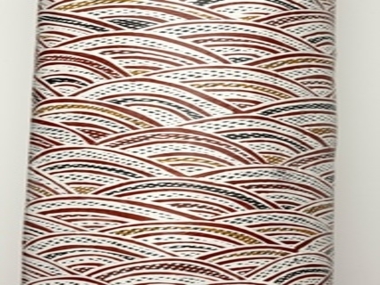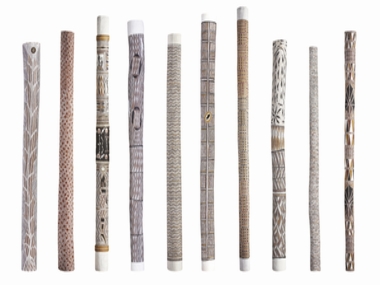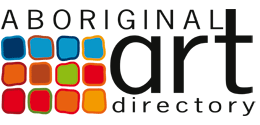IT'S ALL FOLK ART AT BOS 2010

Dhurrumuwuy Marika 'Rulyapa' 2007 (detail) Earth pigments on hollowed log. 242 x 18.7 x 13.2 cm Kerry Stokes Collection Copyright © Buku-Larrnggay Mulka
Posted by Jeremy Eccles | 10.02.10
Dates:
12.05.09
: 01.08.09
Location: MCA. Artspace, AGNSW, Cockatoo Island, Wharf 2, Botanical Gardens
David Elliott, director of the 17th Biennale of Sydney later this year, scratched an old sore today in launching his forthcoming feast of visual arts by asserting that “all art is folk art”.
As a major feature of his BOS is indigenous art from Australia and the Americas, he seemed unaware that many a European curator in the late 20th Century dismissed Aboriginal art from Australia as 'merely folk art' and refused it entry to artfairs, exhibitions, etc.
Perhaps the greatest excitement about this year's Biennale will be the four Native American artists – in Canada, their work is also referred to as Aboriginal art. Their work is a major feature of this year's Winter Olympics in Vancouver – but is almost unknown in Australia. Experiencing the work of Dana Claxton, Beau Dick, Kent Monkman and Annie Pootoogook will be a fascinating ground for comparison. Hopefully the artists will visit too.
There will also be an influx from Arnhemland – via Perth. In 2000, businessman Kerry Stokes set his cap on a great collection of Yolgnu larrikitj – the bone coffins in hollowed tree trunks that used to be an essential part of mortuary rituals in the far north. Indeed, they were first noted at Blue Mud Bay by Matthew Flinders on his circumnavigation in 1802. They still have important ceremonial designs on the sides, and the 110 larrikitj by 41 different artists – including such names as Gawirrin Gumana, Djambawa Marawili, Dhurrumuwuy Marika and Gulumbu Yunupingu - should be a stunning sight in 'forest' formation in Sydney.
Ideally they should be placed on the Sydney Opera House forecourt as a symbolic prelude to a permanent memorial to the Eora Nation which is to be created by curator Djon Mundine. The so-called Tarpeian Rock separating the Botanical Gardens from the SOH will be carved with representations of the two local men who offered the most disparate images of Aboriginal Australia to the first colonists...Benelong and Pemulwuy; the man who offered the hand of friendship, and the man who never laid down his arms. “They're a bit like Cain and Able”, assessed Mundine; “the one who engaged and the one who resisted. We're hoping to engrave them about 5 metres tall”.
Other Australian indigenous artists in the potentially indigestible, 175 artist event – running from May until August – are Brook Andrew, Lorraine Connelly-Northey, Fiona Foley, Christopher Pease and Christian Thompson.
URL: www.biennaleofsydney.com.au
Share this:
»  del.icio.us
»
del.icio.us
»  Digg it
»
Digg it
»  reddit
»
reddit
»  Google
»
Google
»  StumbleUpon
»
StumbleUpon
»  Technorati
»
Technorati
»  Facebook
Facebook
Contact Details

Larrakitj by Yolgnu artists from NE Arnhemland. Earth pigments on naturally hollowed logs : Kerry Stokes Collection © Buku-Larrnggay Mulka
Further Research
Artists: Annie Pootoogook, Malaluba Gumana | Baluka Maymuru | Beau Dick | Brook Andrew | Buwathay Munyarryun | Christian Thompson | Christopher Pease | Dana Claxton | Dhurrumuwuy Marika | Djambawa Marawili | Djirrirra Wunungmurra | Fiona Foley | Gawirrin Gumana | Gulumbu Yunupingu | Kent Monkman | Lorraine Connelly-Northey | Miniyawany Yunupingu | Napuwarri Marawili | Nawurapu Wunungmurra | Wukun Wanambi
News Tags: Biennale of Sydney | David Elliott | Djon Mundine | folk art | sydney opera house
News Categories: Australia
Exhibition Archive
- 10.10.17 | TARNANTHI 2017
- 11.08.17 | Natsiaas 2017
- 20.07.17 | APY ART DOMINATES THE WYNNE
- 17.07.17 | Anangu Artist Wins $100,000 Prize
- 14.07.17 | The End of AAMU
- 11.07.17 | ART ACROSS THE COUNTRY
- 11.07.17 | TARNANTHI IN OCTOBER
- 05.07.17 | TJUNGUṈUTJA - from having come together
- 13.06.17 | Ghost-Nets Straddle the World
- 07.06.17 | Grayson Perry Going Indigenous?
- 05.06.17 | Barks Bigger than Ben Hur
- 27.05.17 | NGA QUINQUENNIAL 2017
- 21.05.17 | Blak Douglas Finds Home at the NGA
- 21.05.17 | BRIAN ROBINSON WINS HAZELHURST WOP
- 18.05.17 | PARRTJIMA 2.0
Advertising

